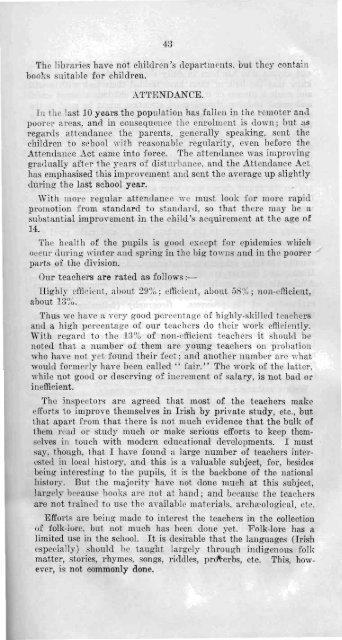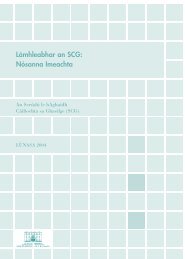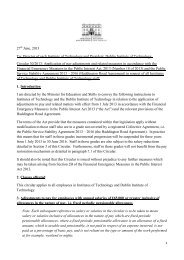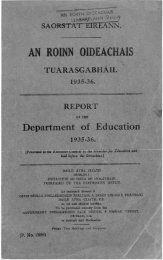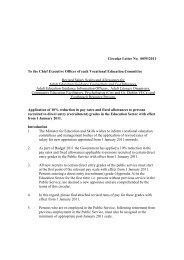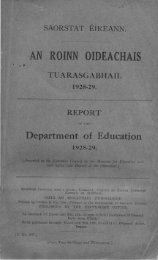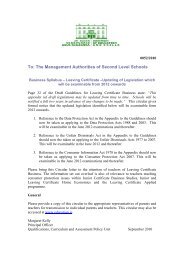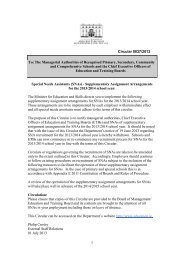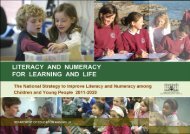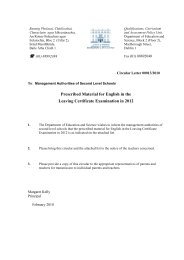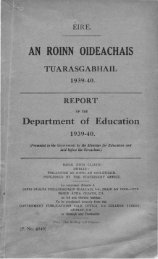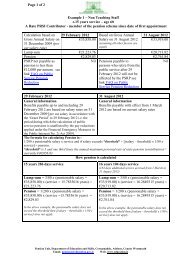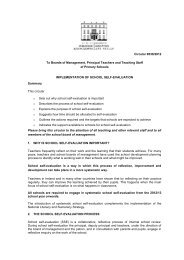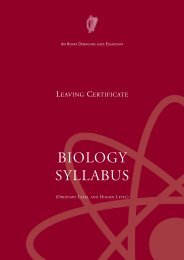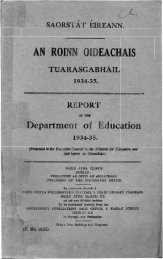42'I'he result is that these young people are left to themselvessubjectto school discipline-..more than is good for them, <strong>and</strong> areretained in the class longer than they ought to be.DIVISION VI.(Limerick, Clare, Kerry, <strong>and</strong> portions <strong>of</strong> Counties Cork <strong>and</strong>Galway.)The division up to 1/9/J 927 comprised most <strong>of</strong> Counties Clare<strong>and</strong> Limerick, all County Kerry, <strong>and</strong> a few chools in CountyCork, in all 727 schools as follows :-Model, 3; Convent, 38;Monastery, 3; Christian Brothers, 11; Ordinary, 672. ThisReport deals with that area. Since 1/9/'27 under the new organi.sation<strong>of</strong> districts nearly 200 schools have been added, <strong>and</strong> allthe schools are in charge <strong>of</strong> seven inspectors with centres in Gort,Ennis, Limerick, Listowel, Tralee, Killarney <strong>and</strong> Charleville.The Division now comprises all Counties Clare <strong>and</strong> Kerry, most<strong>of</strong> County Limerick, about 60 schools in the South <strong>of</strong> CountyGalway, <strong>and</strong> about 80 schools in IT orth Cork.SCROOT, ACCOMMODATIOK~everal schools are housed in buildings which arc unsuitable<strong>and</strong> incapable <strong>of</strong> being adapted, so that many ne" buildings areneeded.The schools vested in the <strong>Department</strong> arc kept in good repair,but the condition <strong>of</strong> schools vested in Trustees is not satisfactory.Repairs are not done promptly <strong>and</strong> the building is allowed todeteriorate. Managers find it difficult to provide funds for upkeep.Many rooms need partitions. The supervision <strong>of</strong> out"<strong>of</strong>fices is not effective, <strong>and</strong> sufficient provision is not as a rulemade for cleaning them.The fact is that. for many reasons. the Managers arc no longerable to keep the school buildings in a good condition much less tosupply the new buildings which are urgently needed.As a rule the schools arc well heated <strong>and</strong> kept neat <strong>and</strong> clean.though there are districts where the cleanliness <strong>of</strong> the schoolsleave much to be desired. School-rooms in charge <strong>of</strong> womenteachers are <strong>of</strong>ten very attractively kept, but in this matter, too,there is zround to be gained before all the schools are as theyshould be, models <strong>of</strong> taste.There arc less than 40 school gardens in the entire division.Outside the Convent <strong>and</strong> Monastery Schools libraries are practical1yunlmown-thcre arc some exceptions. The Kerry CountyCouncilis organising a library service for the county. There aresomepublic libraries in County Limerick also. but I know <strong>of</strong> noneinClare.
43The libraries have not children's departments, but they containbooks suitable for children.ATTENDANCE.In the last 10 years the population has fallen in the remoter <strong>and</strong>poorer areas, <strong>and</strong> in consequence the enrolment is down; but asregards attendance the parents, generally speaking, sent thechildren to school with reasonable regularity, even before theAttendance Act came into force. The attendance was improvinggradually after the years <strong>of</strong> disturbance, <strong>and</strong> the Attendance Acthas emphasised this improvement <strong>and</strong> sent the average up slightlyduring the last school year.'With more regular attendance we must look for more rapidpromotion from st<strong>and</strong>ard to st<strong>and</strong>ard, so that there may be aubstantial improvement in the child's acquirement at the age <strong>of</strong>14.The health <strong>of</strong> the pupils is good except for epidemics whichoccur during winter <strong>and</strong> spring in the big towns <strong>and</strong> in the poorerparts <strong>of</strong> the division.Our teachers are rated aSIfollows:-Highly efficient. about 29%; efficient, about 5 %;about 13%.non-efficient,Thus we have a very good percentage <strong>of</strong> highly-skilled teachers<strong>and</strong> a high percentage <strong>of</strong> our teachers do their work efficiently.With regard to the 13% <strong>of</strong> non-efficient teachers it should benoted that a number <strong>of</strong> them are young teachers on probationwho have not yet found their feet; <strong>and</strong> another number are whatwould formerly have been called" fair." The work <strong>of</strong> the latter,while not good or deserving <strong>of</strong> increment <strong>of</strong> salary, is not bad orinefficient.The inspectors are agreed that most <strong>of</strong> the teachers makeefforts to improve themselves in Irish by private study, etc., butthat apart from that there is not much evidence that the bulk <strong>of</strong>them read or study much or make serious efforts to keep themselvesin touch with modern educational developments. I mustsay, though, that I have found a large number <strong>of</strong> teachers interestedin local history, <strong>and</strong> this is a valuable subject, for, besidesbeing interesting to the pupils, it is the backbone <strong>of</strong> the nationalhistory. But the majority have not done much at this subject,largely because hooks are not at h<strong>and</strong>; <strong>and</strong> because the teachersare not trained to use the available materials, archreological, etc.Efforts are being made to interest the teachers in the collection<strong>of</strong> folk-lore, but not much has been done yet. Folk-lore has alimited use in the school. It is de irable that the languages (Irishespecially) should be taught largely through indigenous folkmatter, stories, rhymes. songs, riddles, pro erbs, etc. This, however,is not commonly done.
- Page 3 and 4: AN ROINN OIDEACHAIS,IUL, 1928.Do 'N
- Page 5 and 6: PARTn.-APPENDICES.I. GENERAL EDUCAT
- Page 7 and 8: 6CHAPTER n.PRDIARY EDUCATIOr .LTHE
- Page 9 and 10: 8 •The above grants are sanctione
- Page 11 and 12: 10Inspection of Schools.Revised Ins
- Page 13 and 14: 12his manner in teaching, his handl
- Page 15 and 16: 14visits paid to him, together with
- Page 17 and 18: 16extracts from the Report by the m
- Page 19 and 20: 18c 6. The Central Joint Committee
- Page 21 and 22: 20" This is to certify that has bee
- Page 23 and 24: 22are in full working order there w
- Page 25 and 26: 24Garden plots and school libraries
- Page 27 and 28: 26showed that the majority of the c
- Page 29 and 30: 28The average age at which the chil
- Page 31 and 32: 30to individual work by the pupils
- Page 33 and 34: 33expect when the circumstances of
- Page 35 and 36: 35tended to decline considerably. P
- Page 37 and 38: 37of the younger teachers, who have
- Page 39 and 40: 39Equipment for infants' exercises
- Page 41: 41older teachers to carry out the i
- Page 45 and 46: 45le dha bhliain anuas: togadh cean
- Page 47 and 48: 4,Deintear obair na naoidheanan go
- Page 49 and 50: 50In the secondary system Rural Sci
- Page 51 and 52: 52The mmrmum time required of the s
- Page 53 and 54: 54courses, and as most Secondary Sc
- Page 55 and 56: 56(ii.) Ni deintar oiread curaim ag
- Page 57 and 58: 58SGOILEA:-INAGEARRCHAILLFuair Fuai
- Page 59 and 60: 60tre Bhearla i dturtaobh le leabhr
- Page 61 and 62: should be trained from the very beg
- Page 63 and 64: 64letter writing of various kinds,
- Page 65 and 66: 67SCIENCE, DOMESTIC ECONOMY, MANUAL
- Page 67 and 68: 69clear that a thorough investigati
- Page 69 and 70: 71to absorb into the trade tho e wh
- Page 71 and 72: 73on the technical schools for inst
- Page 73 and 74: 75fee-paying pupils up to the limit
- Page 75 and 76: 77An analysis of the organisation a
- Page 77 and 78: 79Professor Nils Lithberg, Ph.D, (P
- Page 79 and 80: 81(10) A furth r gift of the origin
- Page 81 and 82: 83bronze tablet, with inscription i
- Page 83 and 84: 85Irish Schools had obtained result
- Page 85 and 86: 87super eded by the Children Act of
- Page 87 and 88: 89Training in girls' schools is lim
- Page 89 and 90: 91school conditions to modern ideas
- Page 91 and 92: 93country it was considered desirab
- Page 93 and 94:
95Expenditure, 1926Rents, Rates Edu
- Page 95 and 96:
97Messrs. R. Collins, H. R. Stewart
- Page 97 and 98:
n.-SECONDARY:r. Schools(0) I (b) (c
- Page 99 and 100:
101(e)SCALES OF_SALARIES OF TEACHER
- Page 101 and 102:
1035. The grants made during the ye
- Page 103 and 104:
105IS. The following is a general s
- Page 105 and 106:
10721.CLASSIFICATION, ACCORDING TO
- Page 107 and 108:
,.1092Z.-RETURN showing for each Co
- Page 109 and 110:
111CONVENTAND MONASTERYSCHOOLS.24.
- Page 111 and 112:
113",",,,,,Fl? m' PUPTLS ox .ROLL:;
- Page 113 and 114:
115.EACH STA~'DARD UNDER N"S'rnUCTl
- Page 115 and 116:
117There are also in the service 9
- Page 117 and 118:
119PREPARATORY COLLEGES FOR THE YEA
- Page 119 and 120:
12140. STUDENTS I.' TRAINING--SESSl
- Page 121 and 122:
123A number of national teachers wh
- Page 123 and 124:
125These Merit Certificates are dis
- Page 125 and 126:
127IRISH PRIZES TO STUDENTS IN TRA.
- Page 127 and 128:
scoLArREACHTAf1290 BHUN-SCOILEANNA.
- Page 129 and 130:
131TEACHERS' PENSIONS AND GRATUITIE
- Page 131 and 132:
133APPEND IX Ill.SECONDARY EDUCATIO
- Page 133 and 134:
135(4) Analytical Tables of the Res
- Page 135 and 136:
137 .BURKE MEMORIAL PRIZES AND E A.
- Page 137 and 138:
139Number of Primary Schools which
- Page 140 and 141:
(K).-TABLE SHOWING NUMBER OF RECOGN
- Page 142 and 143:
(l\:).-TABLE SHOWING NUi\lJ3El{ OF
- Page 144 and 145:
Iq.-TABLE SHOWING NUMBER OF RECOGNI
- Page 146 and 147:
(K).-TABLE SHOWING NUMBER OF RECOGN
- Page 148 and 149:
(K).-TABLE SHOWING NUMBER OF RECOGN
- Page 150 and 151:
(K).-TADLE SHOWING NUMBER OF RECOGN
- Page 152 and 153:
(E).-TABLE SHOWIKG NUMBER OF RECOGN
- Page 154 and 155:
(K).-TABLESHOWING NUMBER OF RECOGNI
- Page 156 and 157:
(K).-TABLE SHOWING NUMBER OF RECOGN
- Page 158 and 159:
,,(K).-TABLE SHOWING NUMBER OF RECO
- Page 160 and 161:
(K).-TABLE SHOWING NUMBER OF RECOGN
- Page 162 and 163:
(K).-TABLE SHOWING NUMBER OF RECOGm
- Page 164 and 165:
(K).-TABLE SHOWING NUMBER OF RECOGN
- Page 166 and 167:
K).-TABLE SHOWING NUMBER OF RECOGNI
- Page 168 and 169:
170APPENDIX IV.TECHNICAL INSTRUCTIO
- Page 170 and 171:
172(c) Table showing the Amounts Co
- Page 172 and 173:
174TABLE C.-ADMISSIOXS I:-ITO INDUS
- Page 174 and 175:
• & ."0176TABLE E.DISCHARGES FROM
- Page 176 and 177:
178TABLE G.Poor Law Industrial Put
- Page 178 and 179:
180The Minister for Posts andTelegr
- Page 180 and 181:
182PURCHASES.Collection of Military
- Page 182 and 183:
184Geomalacus maculosus AlIman, fro
- Page 184 and 185:
186LOANS.1. Two solid gold fibulae
- Page 186 and 187:
188the language in regard to the id
- Page 188 and 189:
190were admitted to class A and 37


